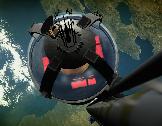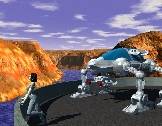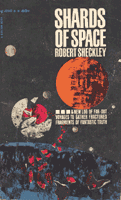ROBERT SHECKLEY
‘UNTOUCHED BY HUMAN HANDS’- ROBERT’S FIRST
PUBLISHED COLLECTION WRITTEN BY‘A MIND THAT IS A LITTLE BEYOND’.
I have before me the original 1954 Ballantine edition
of this extraordinary collection, ’13 stories of the beings
who dwell on the strange borders of reality’ (What wonderful
turns of phrase they had back then!)
I quote from ‘The Multimedia Encyclopedia of Science Fiction’
(Focus Multimedia, 1995):
“Robert Sheckley's first collection, ‘UNTOUCHED BY HUMAN
HANDS’ (coll 1954; with differing contents 1955 UK), is one
of the finest debut volumes ever published in the field, and contains
several tales which have remained famous, including ‘The Monsters’
(1953), the title story (1952), and the superb ‘Specialist’
(1953) which, with an energy and adroitness typical of his early
work, posits a Galaxy inhabited by a variety of cooperating races
who can merge their specialized functions to become, literally,
SPACESHIPS. The story describes the search for a new Pusher, a being
capable of shoving the ship to FASTER-THAN-LIGHT velocities -- unsurprisingly
for the 1950s, Homo sapiens turns out to be a Pusher species. Also
in the collection is ‘Seventh Victim’ (1953), much later
filmed as ‘LaDECIMA VITTIMA’ (1965), in turn novelised
as The Tenth Victim * (1966)”
Here are my impressions:
‘THE MONSTERS’ (12 pages) (1953):
Think about this- is it inevitable that our view of the beauty or
ugliness of aliens be proportionate to how like or unlike ‘us’
they looked?
‘The Monsters’ is a salutary tale of Cordovir, Hum and
others who consider themselves ‘human’ with all that
emotive word implies- (which is?)- and we are merely confirmed in
that (mistaken?) belief by a visit to their planet by a group of
‘humans’ as we understand them.
By the way if you are reincarnated on this planet it’s much
better to be a male than a female for reasons that quickly become
evident.
As with all vintage Sheckley this one really makes you think.
‘COST OF LIVING’ (11 pages) (1952):
In a time when people live to 150 and have every material possession
they could possible want why did Miller kill himself and why is
Carrin uneasy? The answer is as unexpected as the culture on which
it is based. This is another salutory tale about what we in the
UK euphemistically describe as the ‘never never’.
Already we can see the maturity of a writer that belies his 24 years
of age.
As the foreword to the collection says:
“Sheckley’s ideas are not those of most short story
writers. His point of view is often not merely comic but cosmically
comic- the true reflection of a mind that has been described as
‘a little beyond’ in all respects.”
‘THE ALTAR’ (7 pages) (1953):
Slater is on his way to catch a train to work on a glorious spring
morning in the sleepy town of North Ambrose, a place he thought
he knew, when he meets a mysterious stranger. His curiosity is aroused
even more when he meets another stranger and invites himself to
the altar- a wise move?
‘SHAPE’ (17 pages) (originally ‘Keep Your Shape’)
(1953):
The Gloms need to expand their civilisation to yet another planet
but the 3rd planet from the sun is proving troublesome as 20 attempts
at colonisation have already been resisted with no Gloms returning
to tell the tale of what went wrong. So Pid the Pilot, Ilg the Radioman
and Ger the Detector are charged with activating a Displacer in
the reactor room of an atomic power station so that the hordes of
Glom invaders can cross a ‘bridge’ to complete their
conquest. But just what is the reason for the unusual resistance
to the Glom’s plans? A clever twist ensures the story ends
in a totally unexpected way.
‘THE IMPACTED MAN’ (1952) 20 pages
Contractor Carienomen has overseen the construction of a metagalaxy
(549 billion galaxies to you and I) However, Assistant Controller
Miglese is none too pleased with the job.
TO: Construction Headquarters 334132, Extension 12
ATTN: Chief Designer, Carienomen
FROM: Asst. Controller Miglese
SUBJ: ATTALA Metagalaxy
“One of the inhabitants of a planet impinging on the flaw
is impacted already: wedged into the flaw, due entirely to your
carelessness. I suggest that you correct this before he moves out
of his normal time-sequence, creating paradoxes right and left..I
have word of unexplained phenomena on some of your planets; items
such as flying pigs, moving mountains, ghosts, and others, all enumerated
in the complaints sheet.
We won’t have this sort of thing, Carienomen. A paradox is
strictly forbidden in the created galaxies, since a paradox is the
inevitable forerunner of chaos.”
The unfortunate impacted inhabitant is Jack Masrin who is just about
to leave his apartment with his wife Kay to take up a teaching job
in Iowa. When he reaches the 8th step of the first floor landing
he finds himself in prehistoric New York. On another attempt to
leave the apartment he also finds himself in the future-this is
not entirely to his liking! The rent is paid until midnight but
Masrin is in danger of disappearing altogether if he continues his
attempts to leave. How understanding will his landlord Harf be?
Ah, that would be telling!
‘UNTOUCHED BY HUMAN HANDS’ (1953) (15
pages) (originally entitled ‘One Man’s Poison’
in Galaxy Magazine)
Hellman and Casker have a big problem when they land on the planet
Helg. They need to find something edible quickly and only have a
Helg-Aloombrigian dictionary to guide them.
Casker- “What if their meat is our poison?
Hellman- “Then we will assume that their poison is our meat.
Casker- “And what happens if their meat and their poison are
our poison?
Hellman- “We starve.”
Quite a conundrum!
‘’THE KING’S WISHES’ (1953)
(11 pages)
Armed with a ten iron and a mashie niblick Bob and Janice lie in
wait for a mysterious burglar who has sneaked into their shop every
night removing generators, fridges and air-conditioners. Our intrepid
heroes see their future financial security and matrimonial plans
go up in smoke unless they can stop the constant drain on their
resources. Eventually the protagonists come to a mutually beneficial
agreement! There is an echo of ‘The Impacted Man’ here
when Bob also worries about creating paradoxes.
‘WARM’ (1953) (10 pages)
Anders is getting ready to accompany his beloved Judy to a party
when an unwelcome visitor gets inside his head.
“I’m in some sort of limbo,” it says.
His uninvited companion opens the doors of perception so that Anders
can see that:
“Basically there is no form. Man produces gestalts, and cuts
form out of the plethora of nothingness.”
He goes on to accept that there is no such thing as man.
“There are only humanizing features that we-myopically- attach
to it.”
The ending is typically ironic.
‘THE DEMONS’ (1953) (12 pages)
Insurance agent Arthur Gammett is walking up/down Ninth Street,
New York (eye witness accounts lack accuracy) He arrives inside
a pentagon inhabited by Beelzebub’s grandson, a demon named
Neelsebub who threatens to put him in a jar if he doesn’t
bring him 10,000 drasts.
Arthur goes to a lot of trouble to try to comply until he gets some
unexpected help.
Page 113 eloquently portrays the sort of conundrums Sheckley’s
characters regularly face:
“He could produce the drast. That is, perhaps he could if
he found out what it was.”
“He could notify the police. And be locked up in an asylum.
Forget that one. Or, he could not produce the drast- and spend the
rest of his life in a bottle. Forget that one, too.”
‘SPECIALIST’ (1953) (18 pages)
An ungenuous story cemented by a BIG IDEA- the Pusher ( a soldier
on Earth) finds out what’s been missing in his life when he
joins the Cooperation.
The humour is not as much in evidence in the first collection of
Robert’s stories but I did laugh when I read the Pusher’s
first words after two terrifying days aboard the alien space craft:
“My God! A steak!”
Pusher has nothing to do with mind altering substances by the way.
Note that Peter Nicholls, John Clute and company were rather impressed
by this story in their ‘Encyclopedia of SF’. Quite rightly
so!
‘SEVENTH VICTIM’ (1953) (16 pages)
This story became a novel ‘The Tenth Victim’ more of
which later. At last mankind has put an end to war by letting people
kill each other legally (in a purely voluntary organised way of
course)
Stanton Frelaine is doing rather well at this and is well on his
way to his tenth victim and all the resultant prestige and position
when he discovers his next victim is a girl name of Janet Patzig
who’s not as ‘green’ as she seems!
‘RITUAL’ (1953) (10 pages) (originally ‘Strange
Ritual’)
It had been 5,000 years since Elder Singer and his people had been
visited by a ‘god-ship’. Consulting the Giant Book of
Gods the lengthy rituals begin. The ‘gods’ are displeased
but unfortunately their expressions of discomfort are taken as a
sign of approval except by a young dissident named Glat who propagates
something called the ‘Alhona heresy’, a seemingly obvious
solution to appease the ‘gods’.
Another fine example of the communication difficulties (Destabilising
enough on this planet!) that would afflict relations between different
peoples in the universe.
‘’BESIDE STILL WATERS’ (1953)
(4½ pages)
‘Beside Still Waters’ is a beautifully written and touching
story about the relationship between Mark Rogers, a prospector and
his robot Charles on ‘Martha’, their tiny asteroid home.
There are some great lines in this story:
“Rogers had been born old, and he didn’t age much past
a point. His face was white with the pallor of space and his hands
shook a little. He called his slab of rock Martha, after no girl
he had ever known.”
(Also the concluding ones but of course I won’t give the ending
away!)
This would not be the last time Robert would write stories about
prospectors and those desperate to push back the frontiers of space.
As an introduction to this new author Ballantine
Books thoughtfully provide a short biography/ interview with Robert
on page 170.
Born in New York in 1928 and raised in Maplewood, New Jersey Bob
discovered SF in High School. After graduating he hitchhiked to
California, working as a landscape gardener, a pretzel salesman,
a barman, a milkman, a warehouseman and a general labourer in a
hand-painted necktie studio.
He joined the army and was sent to Korea (1946-48) and server as
a guard, an assistant newspaper editor, contracts and payroll clerk
and finally, a guitarist in an army dance band.
Before selling his first story he also worked in an aircraft factory
and as an assistant metallurgist.
ROBERT SHECKLEY
‘CITIZEN IN SPACE’
’12 surprising stories of imagination by a brilliantly gifted
young writer’ (Original Ballantine edition, 1955. The cover
has a nice wash of colour mostly red with a touch of yellow, an
enigmatic monolithic structure and a mysterious figure or 3- a family
perhaps? The book could be bought for the princely ransom of 35
cents.
‘THE MOUNTAIN WITHOUT A NAME’
(1955) (10 pages) (previously unpublished)
The story of planetary construction boss Morrison and Dengue, the
observer from a rival company with a vested interest in things not
quite going according to plan. Statistically improbable bad luck
has haunted the project and the demolition of the mountain with
no name is no exception. Morrison is under pressure from the chairman
of the board of Transterran Steel, Shotwell.
“What’s holding things up?”
“Accidents.”
“More accidents?”
“I’m afraid so, sir.”
And then there are the natives who can’t accept that ‘Work
Order 35 wasn’t their planet’ anymore and who are promising
‘big bad trouble’ in five supernatural categories.
So who or what is really behind the ‘sabotage’. The
answer may surprise you or may not if you are a close observer of
‘Mother Nature’ as the author so obviously is.
‘THE ACCOUNTANT’ (1954)
(10 pages) (originally appeared in The Magazine of Fantasy and Science
Fiction- c. Fantasy House Inc.)
Miss Greeb, 9 year old Morton Dee’s teacher is not happy that
her charge hasn’t learned a single one of the Greater Spells
of Cordus or the identities of the most basic conjuring herbs. So
Mr Dee has to take drastic measures involving his Amulet of Persuasion
and a certain Boarbas, the Demon of Children. And to think that
all the poor lad wants to do is to become an accountant. But just
who is the greatest force- the Accountant or the Wizard? Wouldn’t
you like to know? Harry Potter anyone?
‘HUNTING PROBLEM’ (1955)
(13 pages) (c. Galaxy Publishing Corporation)
STELLMAN- “We surveyed this planet 3 months ago. We found
no intelligent beings, no dangerous animals, no poisonous plants.”
PAXTON- “I’m telling you I saw it move.”
HERRERA stood up- “This tree? All gone now.” (He incinerated
it)
What Herrera does not realise is that the tree is in fact Scouter
Drog who, luckily for him, instinctively quondicated at the flash
moment and thus saved his own skin! Drog’s mission to bring
back a pelt of the large and ferocious animal known as the Mirash
(Guess who?) is thwarted at the moment.. Intelligence has to triumph
over instinctive cunning reasons Drog and he decides that he has
no alternative but to set a trap to gain his coveted prize and the
prestige it will bring. Typically there is a twist in the tale and
some serious observations about the human race.
IN SHECKLEY’S WORLD THINGS ARE NOT QUITE AS THEY SEEM!
He must also be given credit for introducing a new word into the
English language- quondication.
THE LUCKIEST MAN IN THE WORLD aka THE FORTUNATE
PERSON (1954) (3 pages) (Fantastic Universe)
A Patagonian writer tries to convince himself that he has everything.
But something very important is missing! Written in the first person.
HANDS OFF (1954) (24 Pages) (Galaxy
SF)
In an outrageous act of interstellar piracy, Captain Barnett and
his crew, Agee and Victor, steal an alien spacecraft. Incredulously
their freeze blasters do not fatally wound Kalen, the tough Mabogian
pacifistic alien. The main message is man’s (and ‘alien
life forms’) reliance on technology (machinery). Kalen can’t
even crack a nut to sustain himself without his fully automated
spaceship to help him and the three pirates get some nasty shocks
as automated functions on board their ‘prize’ produce
unforeseen and most unwelcome occurrences! Basically the three humans
are not as clever as they think they are. A very engaging story.
SOMETHING FOR NOTHING (1954) (12
pages) (Galaxy SF)
This story is a variaition on the theme of the genie in the bottle
as a Class A Utilizer materialises in Joe Collins’ bedroom.
The ‘wishing machine’ even comes complete with two movers
(hulks actually)
So Collins takes it to upstate NY where he buys a medium sized mountain
and watches while the Maxima Olph construction company build a house
with 20 rooms in less than a day. For anyone waiting for a house
to go up this truly is the stuff of dreams! Anyway, dissatisfied
with his mansion’s location, Collins decants to a small central
American republic where he builds a palace. As the Utilizer tries
to disappear then to run away under the guidance of its owner (or
so Collins assumes), he decides he better ask for as much as possible
while he still can. ’25 more dancing girls, immortality, a
sports car’- you know the kind of thing. Suddenly, both Utilizer
and Collins vanish. The ‘something for nothing; is not what
it appears as Collins proves there is no such thing as free meal
ticket. Another clever story with a neat twist and, again, one that
could have been extended to a short novel.
A TICKET TO TRANAI (1955) (39 pages)
(c. Galaxy Publishing Corporation)
This is a novelette really. Marvin Goodman is determined he is going
to visit Tranai despite the dissuasions of the Transtellar Travel
Agency. Dissatisfied with life in Seakirk, New Jersey, he sees Tranai
as his idea of utopia. The problem is, that Tranai is, as the memorable
character Captain Savage explains while drowning his sorrows in
a local bar, ‘at the edge of the Great Nothing’. Once
Marvin gets to Tranai, he senses something is wrong, ‘something
alien’. According to the Extraterrestial Minister, Den Melith,
Tranai is indeed a utopia- no wars, no crime, no poverty, a stable
economy, no bureaucracy, no corruption’. In short, too good
to be true- and so it proves. A few things are worrying Marvin already-
why did Melith throw his pen against the wall? Why did his wife
appear from a derrsin statis field at the touch of a red button
and just why did Melith consider it necessary to keep a rifle with
telescopic sight and silencer on his wall? Stranger still why is
he offered the Supreme Presidency by the present incumbent so soon
after arriving in this ‘paradise’ world?
Anyway, our hero finds a job in a robot works and is amazed to discover
just how slow the robots on Tranai are, yet consumer research indicates
that consumers want them to be slower still so they can get the
pleasure of ‘kicking the shit out of them’ then buying
another one!
He is light-headed after an arranged date with the lovely Janna
but his illusions are shattered when he is robbed on the way back
to his hotel by a government tax collector (sound familiar?) Robbery,
he is told by the bar tender of the Kitty Kat Bar, is Tranai’s
tried and tested method of wealth distribution. Unfortunately, Marvin
finds robbing as difficult as following Trainai’s ‘unwritten
laws’.
He does marry Janna, honeymooning on the idyllic (too perfect) Doé
and continues to come up with ingenuous ideas in his career of disimproving
robots when he returns. Before he knows it he is on the verge of
becoming Supreme President then he discovers what the rifle is for
and how Trainai’s definition of murder is not quite the same
as Earth’s. The Citizens’ Booth delivers a definitive
verdict on Supreme President Borg’s presidency. (He had committed
the cardinal sin of licencing a second spaceport for Tranai after
all!)
Things can’t get much worse for Marvin but they do!
If you are dissatisfied with life and dreaming of a utopian existence
somewhere perhaps you’d better just stay put! There is always
a catch!
THE BATTLE (1954) (6 pages) (IF
Magazine)
A short and rather perplexing story about the final showdown between
good(?) and evil. The moral seems to be that mankind has once again
betrayed the confidence the creator has put in him but, to be honest,
I’m not entirely sure if this is the intended message. As
I’ve said before I don’t consider such a short length
ideal for Sheckley- he needs the space for his ideas to expand into.
SKULKING PERMIT (1954) (26 pages)
(GALAXY Magazine)
“Tom,” the Mayor said directly, “How would you
like to be a criminal?”
“I don’t know,” said Tom. “What’s
a criminal?”
Everything was ticking along nicely in New Delaware, one of the
colonies that make up the United Democracies of Earth, until the
fateful day their interstellar radio coughed back into life and
imperial Earth made contact. New Delaware had two weeks to get ‘earthified’
before the inspector called. To completely convince the inspector
that it had conformed with the ‘Earth mandate’ the Mayor
orders our hapless hero, Tom, to murder somebody. The problem is
there hasn’t been a murder in 200 years and Tom, in his own
procrastinating way, actually ends up coming to New Delaware’s
rescue. There is an ominous last sentence though as the seeds of
doubt about what constitutes civilized behaviour implant themselves.
CITIZEN IN SPACE (aka SPY STORY)
(1955) (10 pages) (PLAYBOY)
A sphinx valve assembler called Bill decides to explore deep space
and is surprised to find a stowaway in his ship, a rather attractive
young lady called Mavis O’Day. The reader gasps in incredulity
at the next development
‘Outside in the last vacuum of space was a single fragment
of rock. Perched upon it was a child in a spacesuit holding a box
of flares in one hand and a tiny space-suited dog in the other.’
They are not just there to shock of course but to make a point about
human relationships as Roy so eloquently explains when inside Bill’s
spaceship. Once Bill lands on an uninhabited planet other spies
come to call and stay under false pretences, sabotaging their own
ships in the process. Yes, the girl, the boy, maybe even the dog
are all spies! There’s been a technical hitch though and things
change for the better or do they? With ‘cold war’ and
spy satellites on the horizon this is a prescient tale of paranoia
from a master storyteller.
ASK A FOOLISH QUESTION (1953) (9
pages) Science Fiction Stories
A fascinating if embryonic tale that is fast becoming one of my
favourites as various entities visit a planet circling a sun to
contact Answerer, the ultimate oracle. Douglas Adams surely must
have read this before his Deep Thought provides ‘42’
as the answer to the ‘meaning of life’ in ‘Hitch-hiker’s
Guide to the Galaxy’. Or is my imagination just running away
with me? After all wasn’t it Gary Brooker who, after consulting
the Dalai Lamai produced the answer, “life is like a beanstalk,
isn’t it? In ‘In Held ‘Twas In I’?! Now
I have lost the plot!
PILGRIMAGE
TO EARTH- from 'Pilgrimage To Earth'- 'A
fresh and daring insight into the man of tomorrow- a man with the
power of a god and the sudden whims of a reckless adventurer.' (1959)
Here are my thoughts on some of the stories in it:
LENGTH: 12 pages
CHARACTERS: Alfred Simon/ Penny Bright
PLOT: Alfred from a planet near Arcturus is a farmer who pines for
romance. He buys an ancient poetry book from a vendor who is 'a
little mad', sells his farm and arrives on Earth.
BEST LINE: "You folks specialise in farming? Well Earth specialises
in impracticalities such as madness, beauty, war, intoxication,
purity, horror and the like."
Or
"You're looking for war, you've come to the right place. We
have 6 major wars running at all times."
ISSUES: Feminism, prostitution, aggression of human race, science
("Believe me, there's nothing science can't produce as long
as there's a market for it.")
BIGGEST ANTI CLIMAX: 'Simon went to the refreshment stand and ordered
a small glass of coca cola.'
STRANGEST LINE: 'Communism in Wales'.
'MAKES YOU THINK' LINE: 'He gave up natural selection centuries
ago shortly after the Mechanical Revolution."
FAVOURITE LINE: 'Passion beneath the lunatic Moon'.
TWIST IN THE TALE: The ending is not entirely unexpected but still
has a shock element.
-
as near darned perfect a short story as you'll read. It's very readable
and thought provoking.
'ALL
THE THINGS YOU ARE'
LENGTH- 11 pages
CHARACTERS- Jan Maarten, Croswell, his assistant, various Durellans
led by Chief Moreri.
JOB- First Contacter
LOCATION- Durell IV, a planet physically comparable to Earth.
ISSUES/MESSAGE- Don't mess with different cultures or assume that
science has all the answers! Aggression of humans touched upon.
MOST PERTINENT/ FAVOURITE LINES: "The most unrespected law
in the universe. Whatever can go wrong will go wrong."
Or
"We're living chemical factories- only turning out poison gas
and corrosives exclusively." (Croswell)
"But that is not all you are. Look." (Chedka) (The 'Twist
in the Tale' line)
| |
 |
|
'TRAP'
LENGTH- 9 pages
CHARACTERS- Dailey and Thurston, two 40 somethings. One is a 'gadget
man', the other a '(love) hunter'. Samish and friend.
FAVOURITE LINE- '..they returned to the city tanned and refreshed
with a new lease on life and a renewed tolerance for their wives.'
ISSUES/ MESSAGE: The acquisitive nature of man. "A Terran will
keep anything."
TWIST IN THE TALE: Terrans are even more acquisitive than Samish's
friend thought and Samish's friend is less of a friend than he thought.
A great yarn that could have been much longer.
'THE
BODY'
LENGTH- 5 pages
CHARACTERS- Professor Mayer, Cassidy, Feldman, Kent
PLOT- Mayer is changed into a dog so he can 'carry on the great
work where Einstein and the others left off.'
TWIST IN THE TALE?- A little one at the end
A disappointing story. Mayer seems to adjust too quickly to his
new form and of course because of the shortness of the story the
plot is not developed. Humour is corny!
'EARLY
MODEL'
LENGTH- 20 pages, a much better length for the author to work his
magic.
CHARACTERS- Bentley, Professor Swigert, the Telicans from Tels 1V
predominantly Huascl)
PLOT- The Protec back pack does not work according to plan.
TWIST? Yes
'DISPOSAL
SERVICE'
LENGTH- 5 pages
CHARACTERS- Mr and Mrs Ferguson, Miss Dale, Mr Ferguson's Secretary
and Mr Esmond from Disposal Service
TWIST- Good one- says a lot about trust and deception.
Would have made a good 'Tale of the Unexpected'.
'SHARDS
OF SPACE'
One of the endearing qualities of 60s sci-fi collections are the
appetising vignettes on the covers. Like this from the front cover
of the 1962 Bantam edition- "A new log of far-out voyages to gather
fractured fragments of fantastic truth." Or inside: "Robert Sheckley
prowls the long beaches of infinity where he garners glittering
strands of flotsam and jetsam." Or how about this on the back?
RUPTURED GALAXIES
BUSTED TECHNOLOGIES
FRANGIBLE PLANETS
INFINITE FRAGMENTS The uncredited art work shows splintering planets
and moons and a 40 cent price tag that just might have been one
the bargains of the decade!
Written
in 1959 for Galaxy magazine 'PROSPECTOR'S SPECIAL' (22 pages) is
Sheckley at his best. Tom Morrison is down on his luck and topples
his sandcar while prospecting for goldenstone on Venus's Scorpion
Desert. He has to survive amidst mounting obstacles including unpaid
phone bills and a surprisingly flexible bureaucracy. His salvation
comes from an unlikely source and the 'prospector's special' of
the title is perhaps not what was expected! Entertaining, witty
and engaging!
'THE GIRLS AND NUGENT MILLER' (11 pages) was written in 1960
and our hero is the survivor of a nuclear holocaust who goes off
armed with a Geiger counter in search of other survivors only to
find the formidable Miss Dennis and her 4 young ladies. There is
a nice twist in the tale!
'THE SLOW SEASON' (6 pages) was originally written for 'The
Magazine of Fantasy and Science Fiction' in 1954. It's a pretty
weird tale of a tailor named Slobold who's down on his luck and
gets a lucrative contract that is not quite what it seems.
I'm not entirely sure what the point of the 1956 story 'ALONE AT
LAST' was apart from the obvious determination of a man named Arwell
(despite advice to the contrary) to be 'alone at last' on an asteroid
of his choosing. Of course he is not really alone but the potential
for a fascinating story is not realised in the 5 pages of 'Alone
At Last'.
'MEETING OF THE MINDS' is at 35 pages the longest story in
this collection by far. It was originally published in Galaxy Magazine
in 1960 and part one concerns Captain Jensen's disillusionment with
his ship's lack of scientific discoveries following a flight to
Mars. Jensen's disappointment turns out to be ill founded as an
intelligent scorpion like bug called Querdak has hitched a ride.
The Querdak is actually a corporate entity, an idea preceding Star
Trek's Borg by many years- I'm not even sure where such an idea
originated- can someone out there enlighten me? Anyway, having stowed
away in a crate the Querdak has taken over one of the humans participating
in a treasure hunt in the Solomon Islands. The question is will
the treasure hunters survive as the Querdak begins to control all
the animals on the island? The characters are well drawn, the story
develops at a good pace with an appropriate level of suspense. Indeed
'Meeting of the Minds' could have been developed into an excellent
novel.
'FOOL'S MATE' was written in 1953 for 'Astounding Science
Fiction Magazine'. Earth is being stripped of radioactives to supply
a space fleet that has been sniffing the enemy' like a discontented
dog' for 11 months and 4 weeks by the time the Presidential Voice
in Space, Ellsner arrives to find out the reason for the stalemate
and why reports resembling combat fatigue are being received on
Earth when not a shot has been fired. Apparently there is a pact
not to bomb home planets. Instead Configuration-Probability Calculators
arrange the fleet in optimum attack-defence patterns. This is not
the first time Bob Sheckley uses chess in his stories- part of an
actual game is played out in 'Meeting of the Minds' for example.
This time though it turns out chess is not an accurate analogy for
this tense situation. As Lieutenant Nielsen sits at the controls
of his gunfire panel suffering from a form of inverted shell shock,
the crew can either wait two years and go completely off their heads
orů? 'Fool's Mate' is a prescient and cautionary tale ingenuously
related.
'SUBSISTENCE LEVEL' is perhaps what 'Alone At Last' might
have been. Strange that it was written 2 years earlier in 1954.
Amelia and Dirk are two pioneers setting up a new home on an asteroid.
Soon they are pioneers no longer as society and consumerism close
in and a decision has to be made. This is an imaginative story depicting
in some detail the technology necessary for planetary settlement.
There are some great one liners by Dirk- "Some of my best friends
are robots." and "Robots are congenital drunks." I wonder what Isaac
Asimov would have to say about that?
'FOREVER' is a 10 page story from 1953. Dennison has discovered
an immortality serum but someone (turns out to be an organisation)
is taking more than a passing interest. Dennis ends up in the 'Immortality
Club' and discovers to his amazement that he is not alone in more
ways than one! This is another ingenuous, thought provoking story
that could have been longer. Bob's famous book 'Immortality Inc.'
(turned into that awful movie 'Freejack'- more of which later) looked
at this subject from a different angle of course. By the way the
first story about immortality is reckoned to be Jonathan Swift's
'Gullivers Travels' from 1726.
'THE SWEEPER OF LORAY' is a 12 page story from 1959 published
again in Galaxy. Human frailty is once more exposed as Fred and
Carver decide to steal a healing drug that also turns out to be
a longevity drug that with repeated prescription may even turn out
to be an immortality drug! There is of course a twist in the tale!
Another Carver, a Doctor rather than Professor this time, as a part
in the last story 'THE SPECIAL EXHIBIT'- is 4 pages long
enough for a satisfying tale? It can be of course. Believe it or
not the Jeff Renner story published in 'Fantasy and Science Fiction'
in 1964
Boy Meets Girl,
Boy Loses Girl,
Boy Builds Girl.
is not actually the shortest- not by a long way but that is another
story! To me 'The Special Exhibit' doesn't quite make it as it is
obvious early on that Mrs Grant has something rather unpleasant
in store for his egocentric wife. Bob Sheckley's stories need space
to breathe and there just isn't enough here.
Still the vast majority of 'Shards of Space' is brilliant!. Any
serious sci-fi enthusiast needs a copy of this one on his/her shelf.
CAN
YOU FEEL ANYTHING WHEN I DO THIS? AKA THE SAME TO YOU DOUBLED (16
stories) (1974)
(Some key ideas and facts are in bold)
’16
bizarre glimpses into the future’ where ‘rules
of logic have been thrown to the wind’ and Bob Sheckley’s
‘grasp of the human condition leaves the reader more
than a little disconcerted, amused and finally lost in thought’.
I am the proud owner of a signed Daw books edition printed in April,
1974, the stories themselves having been written between 1961 and
1971.

As in most collections my enjoyment varied from the ‘file
under forgettable’ to the ‘mind bogglingly brilliant’.
Examples of the latter include ‘The Petrified World’
(see Bibliography for origins of all stories). This story
concerns a certain Mr Lanigan who has a recurring dream. He decides
to see Dr Sampson once again. Lanigan is worried that ‘Some
day I am going to wake up and find myself in that world. And then
that world will become the real world and this world will be the
dream’. (The story has some wonderful metaphysical
dialogue).
“How do you prove to a man that he is not being controlled
by a secret radio which only he can hear?”
When Sampson says, “The nature of the world is apparent, not
provable’, Lanigan thinks for a while.
“Look Doc, I’m not as sick as the guy with the secret
radio, am I?”
They agree that the real world is simply what most men think it
is.
Lanigan says, “Suppose there are many worlds and many
realities, not just one? Suppose this is simply one arbitary existence
out of an infinity of existences?”
Strange things are happening around Dr Sampson.
The story is about the descent into insanity or to be more precise
disconnectedness.
It struck me that this idea has an echo in the future in the Borg’s
‘disconnected from the collective’ in Star Trek.
I’m sure we’ve all had the feeling of unreality, detachment,
being on the outside looking in, feeling almost is if we are part
of a computer game. This story exaggerates these feelings to nightmare
proportions. ‘The Petrified World’ is a thought provoking
if frustratingly short story.
Other commendable stories are ‘Dr Zombie and his Little
Furry Friends’ as much Edgar Allen Poe horror as
sci-fi, grimly prophetic of genetic engineering; ‘The
Cruel Equations’ a clever tale on machines
whose programming does not allow for the flexibility of human response
as Lieutenant Halloran desperately tries to get back out of the
scorching heat of Regulus V to the sanctuary of the camp but first
he must pass an intransigent robotic guard. The story ends with
a robot’s eye view of the final course of events. (The moral
of this and other tales is don’t bypass Sheckley’s robot
stories once you’ve read Asimov’s!)
‘The Same to you Doubled’ is a variation
on the ‘genie in a bottle’ theme with
Edelstein getting a visit from a ‘field man for the devil’
and being granted three wishes with a difference!
I guess not many people were talking about ‘mnemonics’
when ‘The Mnemone’ was written and
Tony Buzan was still a dot on the horizon. ‘Mnemones
as a distinct class came into prominence during the last year of
the War Which Ended All Wars. Their self proclaimed function was
to remember works of literature which were in danger of being lost,
destroyed or suppressed.
‘Tripout’: Papazian arrives on Earth
by telephone booth (no, not by police box but, beware, Doctor Who
is back on UK TV screens!) ‘I’m Aldebaranese on my mother’s
side’ he remarks to a hot dog vendor in a sleazy diner (as
you would)
Papazian woke up and changed his name to Hal (Haven’t
I heard that name somewhere before?) The story seems to take a distinctly
‘Hitchhikers Guide to the Galaxy’ twist
(What did you make of the film by the way?): ‘Earth’s
an exciting place. Too bad it has to be destroyed’. (This
is not actually what the story is about as there is no further reference
to it, just a line casually thrown in). Papazian/ Hal’s long
suffering wife Ellen writes a book called ‘Return from Deepest
Space: One Woman’s Account of Her Life with a Man who Believed
He was from Aldebaran’ (Well, you would, wouldn’t you
if you were in her position?)
The author can’t resist taking an acerbic pop in his final
sentence ‘He knew that Earth was a nice enough place
for a vacation; but one couldn’t really live there’.
(We all know we live on a beautiful planet but we also know what
Bob means!)
Another standout is ‘Pas de Trois of the Chef and
the Waiter and the Customer’, a clever allegorical
tale of the same events seen from the perspective of three people
in a restaurant in Ibiza.







